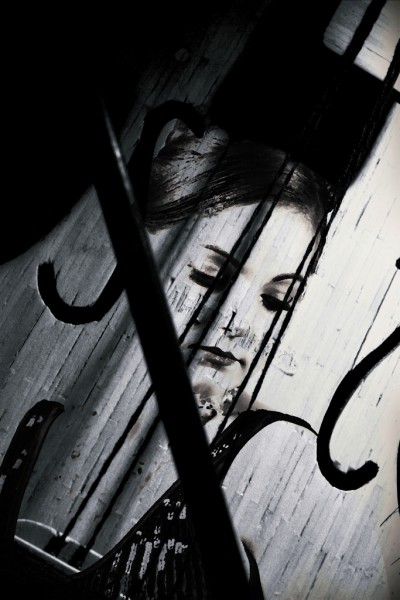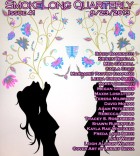Park Street Hotel is famous for its hauntings. Ghost hunters stare into cameras set to night vision and make vaguely constipated faces to signify the feeling of long ghost fingers on their hands and shoulders. College kids visit during Spring Breaks and drink overpriced Natural Ice from the hotel bar. When enough has been consumed, they yell at the ghosts to bring it. Families who forgot to reserve rooms at the Best Western occasionally appear.
Enthusiastic guests try to request floors based on hauntings. Seventh Floor Ghost specializes in animals. She starts each evening by controlling cockroaches; forcing them to skitter across the carpets, move up and down the walls. Throughout the night, more and more animals appear: a large, beautiful horse standing in the shower; a komodo dragon’s face reflected in the vending machine’s glass; a snarling wolf at the foot of a bed; and a large panther stalking the hallway, its tail flicking with excitement.
“I used to be a lion tamer,” Seventh Floor Ghost tells the other ghosts, smiling modestly after an especially beast-filled night.
The Second Floor Ghost is the most popular; he uses pop culture references. Nights are revving chainsaws, little girls in long white dresses oozing out of television sets, a family with hooks for hands, a man wearing a fedora that enters dreams. The attention has made him arrogant.
“Baby,” he regularly says to any ghost who’ll listen, even the popular ones, “you’ve got to be contemporary, you’ve got to have flair, or no one will ever want to visit your floor.”
When he was alive, the other ghosts whisper, he was just a janitor.
The Eleventh Floor Ghost rarely haunts. She wisps through her floor, waiting for the guests to fall asleep. When they’ve given up on any potential for haunting, she borrows their laptops and browses the web. The other ghosts assume she is obsessed with what comes after, but her most frequent Google searches are:
- How do you access repressed memories?
- Were panthers ever real?
- What does steak tartare taste like?
- Can animals be ghosts?
- Why would memories be hidden?
In the rare mood to haunt, her efforts are half-hearted: whistling or crying in ears; a glowing, violet dot in a person’s peripheral vision that sometimes elongates to a humanoid shape; and freezing cold temperatures. More than once, a visitor has said, “You could try a little harder.”
The other ghosts thrive. They keep track of the type of people they scare, the number of screams and goose bumps they cause. They brag about their television appearances and suggest horror movies have been based on their hauntings. Once a week, they congregate in the bar and discuss who they used to be. The Eleventh Floor Ghost dreads those nights most.
As the others tell stories of their families and jobs and floppy-eared long dead dogs, she sits at the end of the bar, running her long fingers on the wood grain, letting them become immaterial as she attempts to remember. Sometimes another ghost will take pity on her and sidle over and say half-hearted platitudes about how little the past matters. But most nights, the Eleventh Floor Ghost is left to speculate and imagine.
“I used to be Marilyn LaBern, the heiress found wearing only a glorious diamond necklace, lying in a bathtub full of blood,” she whispers to herself. She is unsure of whether or not LaBern even existed or is a story she invented. She types the words “Marilyn LaBern” into the search box almost every night, but never clicks for results.
“I used to be a cook. I see my hands slicing tomatoes. I was a mother. I was a grandmother. I was a young woman struck by a car. An old woman dying slowly of cancer,” she whispers to herself, forgetting she is not alone.
The other ghosts watch her mist in concern.
Depressed, the Eleventh Floor Ghost quits haunting. She drifts into 1115 and crawls into bed next to a couple watching Top Chef.
“Who’s your favorite?” she asks them.
The first woman goes through the contestants explaining their strengths and weaknesses. Finally, she chooses “the chick with a lot of range.” ”
Her?” the ghost asks, nodding toward the woman adding watermelon to her scallop dish as sweat drips down her brow.
“Yeah,” her wife replies.
The night is so relaxing—what is it about watching people chop vegetables? The Eleventh Floor Ghost frequently wonders—that reality television becomes the ghost’s solace.
She becomes skilled at differentiating between real housewives; she can identify designer credenzas at a glance; and knows when to be witty and when to be reverent about different dishes chefs put forward. People tired of being scared request her floor. They bring bottles of wine and during commercials, confide their secrets to the ghost.
“Maybe I used to be a chef,” she says while credits roll, happy in the thought.
The angel appears while the Eleventh Floor Ghost is watching Master Chef in an unoccupied room.
“I can’t believe she’s blind,” the ghost says before she notices the angel.
“You may move on,” the angel responds. Its wings are pearls.
“Is there TV?” the ghost blurts. She has never been told angels exist and is stupid in her surprise.
The angel rolls its eyes. They sit in silence, the television’s blue-white light washes them twilight.
“Can you tell me who I used to be?” The ghost’s voice wavers.
The angel is silent.
The ghost looks at the screen. Gordon Ramsay is in a beneficent mood as he praises the woman’s dish. All the joy in the world is there as the woman basks in success.
“Was I?”
She is unsure how to finish the question; she wants to have been everything so much, desire beats in her like a resuscitated heart.
The ghost sees the chopped tomato again, she smells warm apple pie, she gulps a salty oyster.
“I understand,” she says, but the angel is gone.



 The core workshop of SmokeLong Fitness is all in writing, so you can take part from anywhere at anytime. We are excited about creating a supportive, consistent and structured environment for flash writers to work on their craft in a community. We are thrilled and proud to say that our workshop participants have won, placed, or been listed in every major flash competition. Community works.
The core workshop of SmokeLong Fitness is all in writing, so you can take part from anywhere at anytime. We are excited about creating a supportive, consistent and structured environment for flash writers to work on their craft in a community. We are thrilled and proud to say that our workshop participants have won, placed, or been listed in every major flash competition. Community works.